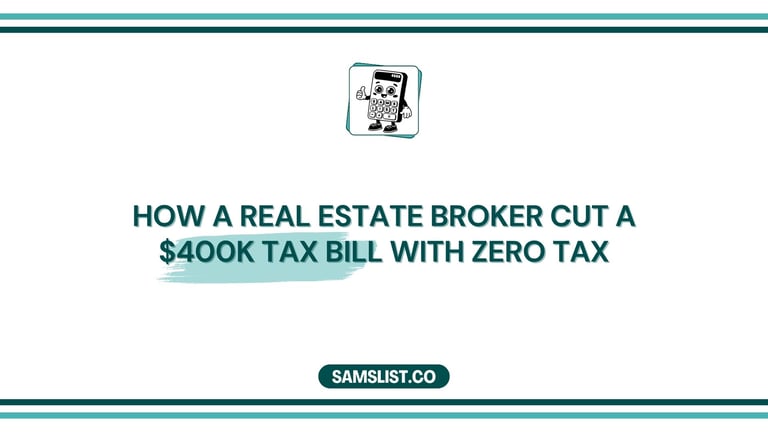TL;DR:Jake, a commercial real estate broker in Tampa, closed a $20M+ shopping center deal that came with over $500K in commission. To avoid a massive tax bill, he found Greg onSam’s List—a CPA and former tax attorney who helped him reduce his taxable income by nearly $400K using four strategic tax moves. Here’s exactly how they did it.
Meet Jake – A Tampa-Based CRE Broker With a Big Win
Jake is an independent commercial real estate broker who focuses on selling retail properties—shopping centers, leasing deals, and small business sales. After relocating to Tampa during the pandemic, he set up his own operation and started building a strong pipeline.
In 2023, he closed a major deal: a shopping center in Palm Beach County that brought in over $500,000 in commission.
That win was exciting—but it also triggered a serious tax liability.
Why Jake Needed a Strategic Accountant (Not Just Tax Prep)
Jake had been working with a legacy accountant back in California, but after the deal, he wanted someone local and more proactive.
He found Greg on Sam’s List.
Greg is the founder ofZeroTax—an accounting firm designed for small business owners doing $250K to $5M+ in revenue.They offer flat-rate packages that includetax prep,bookkeeping, consulting, andfractional CFO services. His background?Tax attorneyturned CPA.
So he brings both legal and financial precision to every strategy he builds.
4 Tax Strategies That Saved Jake Nearly $400K
Once they connected, Greg pulled four major levers to reduce Jake's taxable income:
Amended past returns:Found $250K+ in missed expenses from prior years and carried them forward as net operating losses.
Set up anS-CorpandI-401(k):Used Jake’s business structure to create ~$40K in deductions via employee deferrals and employer match.
Bonus depreciation on a vehicle:Bought a qualifying vehicle used for business to deduct ~$50K immediately.Learn more from the IRS.
Pulled forward business expenses:Prepaid 2024 subscriptions and services—like CRE data tools—to deduct ~$50K in 2023.
Total tax bill? Nearly zero.
The One Tactic I Had Never Heard Before
Here’s what stuck with me personally: I didn’t even know you couldpull forward expenseslike that.
If you know you’re going to renew a service next year (like software, subscriptions, or ongoing tools), and you prepay for it now? That counts as a deductionthis year.
It’s also a smart negotiation tactic. Jake got better rates from vendors for paying up front.
And that was just one of four things Greg did.
Why Picking the Right CPA Actually Matters
Jake didn’t pick the cheapest option. He picked someone who understood his business, knew how to move fast, and had the technical depth to deliver real results.
That’s the difference between year-end prep and proactivetax planning.
Want Help Like Jake Got?
If you’re a business owner doing $250K+ and want a strategic accountant who gets stuff done:
Greg is taking free intro calls onSam’s List. Every firm is vetted. No spam. Just real people doing sharp work.
Book a call here →samslist.co
FAQs
What’s the difference between a CPA and a tax attorney?
A CPA is licensed to prepare taxes and advise on financials. A tax attorney is legally trained to interpret tax law. Greg is both.
Can I deduct prepaid expenses?
Yes, if it’s an ordinary and necessary business expense and paid in full—like software subscriptions or vendor services.
What’s bonus depreciation?
It allows businesses to deduct the full cost of qualifying property (like vehicles or equipment) in the year it’s placed in service.IRS link
Is an I-401(k) the same as a Solo 401(k)?
Yes—both are retirement plans for self-employed individuals or business owners with no full-time employees other than a spouse.
You Might Also Like
- Accountant for Startups: Cash-Burn Control & Fund-Raise Ready
- Accountant for High‑Net‑Worth Individuals: Beyond Tax Prep
- What Does a Bookkeeper Actually Do? Responsibilities, Tools & When to Hire
Author: Kimi, Co-founder of Sam’s List
Kimi writes about what she's learning while building Sam’s List and shares honest takeaways from her conversations with accountants and financial advisors across the country. None of this is financial advice—just the stuff most people wish someone told them sooner.






